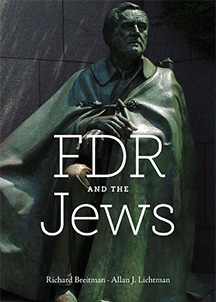By Fred H. Lawson
Why the United States did not exert greater and more effective efforts to stop National Socialist Germany from exterminating the Jews of Europe remains a hotly debated question. Responsibility for Washington’s purported failure to act is usually attributed to President Franklin D. Roosevelt, on the grounds most pithily articulated by his successor Harry S. Truman: No matter what, the buck stops on the chief executive’s desk. It is hard to tell whether or not Richard Breitman and Allan Lichtman agree with this venerable adage. Despite the title of the book, much of the narrative concerns other influential actors, both inside and outside the policy-making machinery.
FDR and the Jews does advance a number of claims about Roosevelt himself. The book proposes, most importantly, that the president’s dozen years in office should not be considered as a single unit, but instead as a series of discrete episodes. In the first, from 1933 to 1937, the authors assert that “Roosevelt did little to assist the Jews of Germany. He failed to speak out against Nazi persecution of Jews, to try to put public pressure on Adolf Hitler, or to rally the world’s democracies against Hitler’s anti-Semitic policies.” From 1938 to the end of 1941, by contrast, Roosevelt pressed the Federal bureaucracy, the British government and the leaders of a variety of other countries—most notably the Dominican Republic, Bolivia, Cuba, and Belgium—to provide safe haven for German, Austrian, Czechoslovakian, and Polish Jews. After Pearl Harbor, however, Roosevelt put national security ahead of humanitarianism and devoted his full attention to the imperatives of the battlefield. Not until after D-Day did “a fourth Roosevelt” emerge, who encouraged the War Refugee Board to seize the initiative in rescuing the endangered Jews of Hungary and might well have acquiesced in the bombing of Auschwitz by the U.S. Army Air Force.
Breitman and Lichtman excuse the president for ignoring the persecution of Germany’s Jews during his first term, since there were other, more immediate problems confronting him. They give him high marks for Washington’s actions during the four years leading up to the war: “Even limited resettlement in Latin America would not have taken place,” the authors note, “if the Roosevelt administration had looked on with indifference to the plight of Jews trapped in Hitler’s Europe as war approached.” Understandable fears that Jewish refugees might constitute a Fifth Column in the countries they entered prevented U.S. officials from raising immigration quotas after the war broke out. When the tide of battle turned decisively in favor of the Allies, Roosevelt at last proved his mettle by doing substantially more than Winston Churchill to protect the Hungarian Jews.
Three things make FDR and the Jews much less compelling than it might have been. First, and most irritating, is a general tendency to report fact after fact with little attempt to marshal evidence into a coherent argument. It is at times hard to tell just why some sentences are grouped together as paragraphs, particularly in the first five chapters. If the authors intended to make a case about Roosevelt’s attitudes or actions toward the Jews, it ends up getting lost in the shuffle. Second, one is never quite sure whether the study concerns Franklin D. Roosevelt and the Jews or the United States and the Jews. Perhaps this does not matter in a broad sense, but the distinction does make a crucial difference for the way the analysis proceeds. Early chapters place Roosevelt squarely at the center of the story; later chapters, particularly the ones dealing with the Middle East (chapter 12) and Hungary (chapters 13 and 14), ignore the president almost entirely. One comes away from the lengthy analysis of activities of the War Refugee Board, for instance, with the strong impression that it was bureaucratic politics—not presidential will or leadership—that determined U.S. foreign policy.
Finally, the text occasionally tosses up surprising pronouncements, which deserve some sort of supporting evidence or argumentation. “Before his postwar decline,” readers are told, President Woodrow Wilson “had privately endorsed Britain’s ‘Balfour Declaration'” [emphasis added]. “FDR had long recognized dangerous tendencies in Germany, and he no doubt detested Hitler, Nazi ideology, and the persecution of German Jews.” By the spring of 1933, three key members of Roosevelt’s Department of State, William Phillips, Wilbur J. Carr, and Jay Pierrepont Moffat “were all restrictionists [regarding Jewish immigration] and held anti-Semitic beliefs in a department rife with such sentiments” [emphasis added]. “FDR had a romantic attachment to farming, and agricultural settlement represented the path of least resistance for Jewish immigrants to Latin America” [emphasis added]. And to anyone interested in the Middle East, the most glaring of all: In December 1942, “FDR asked [Henry] Morgenthau [Jr.] to ‘go easy’ [on the question of expanded Jewish immigration to Palestine], because he had made up his mind: 90 percent of Palestine should be Jewish. Arabs should be moved out to land elsewhere in the Middle East and replaced by as many Jewish families as Palestine could absorb. Palestine would then become an independent state. Although he did not say so explicitly, this was a postwar program” [emphasis added].
FDR and the Jews has received a great deal of attention in both scholarly and journalistic circles, and grapples with a controversy that continues to have relevance for today’s world. Perhaps it is fitting that the text constitutes a kind of Rorschach test, in which different readers will find bits and pieces that they can construe in whatever way they think best.
Fred H. Lawson (ΦBK, Indiana University, 1973) is the Lynn T. White, Jr. Professor of Government at Mills College and a resident member of the Zeta of California chapter of Phi Beta Kappa.




